|
Roundup Staff Article
As the Northern Combat Area Command troops of Lt. Gen. Dan I. Sultan drove the Japanese south, British 14th Army units virtually closed the trap on an estimated 30,000 of the enemy if the Myingyan, Meiktila, Mandalay triangle.
Army News Service said the fate of the Nips caught in Central Burma was practically settled by the drive of the British Second Division to within four miles of Kyaukse, eliminating a sizeable pocket of resistance on the Mandalay-Rangoon Railroad. Myittha, vital Jap rail junction, has been taken by British forces.
ARMORED FORCES
The Jap forces were facing one British force which had hit out from newly-captured Mandalay and another force which had come from the airborne-seized Meiktila area. The Nips are facing powerful British armored forces and are under continuous aerial bombardment by planes of Eastern Air Command. Army News Service said the enemy has the choice of fighting to the death or taking to the minor mountain trails east to Thailand.
Sultan's Chinese First Army and 50th Chinese Division troops have cleared the Lashio-Hsipaw Road and joined up about 13 miles east of Hsipaw. The British 36th Division men, commanded by Maj. Gen. Francis W. Festing, after occupying the ruby center of Mogok, have advanced to Kankang, 35 miles southeast of Mogok against no opposition. Kankang is only two miles north of the Lashio-Mandalay Road.
CLEAR 158 MILES
In a period of just two months, the Sultan forces have cleared the Burma Road from Mong Yu, junction with the Ledo Road, through Namhsim, a distance of 158 miles. Other Chinese troops have cleared the road about seven miles west of Hsipaw to Namhsim, about 14 miles due east of Kyaukse.
Mandalay, second city of Burma and communications hub, fell to the British last week after the Japanese garrison in Fort Dufferin withdrew under cover of night.
From Mandalay extend railroad lines to Rangoon, 386 miles to the south, to Lashio, where the Burma Road begins, and to Sagaing to the west, and another line running north parallel with the Irrawaddy to Myitkyina.
Twice during the week, Brig. Gen. R. M. Ramey's XX Bomber Command B-29's, in sizeable strength struck at the Jap-held port of Rangoon, inflicting considerable damage on military installations and storage areas. Fighter opposition and ack-ack were reported as moderate, with all Super-Forts returning to base.
HOME LEAVE NOW 45 DAYS FOR KEY MEN
Roundup Staff Article
The 30 days previously granted India-Burma Theater personnel on temporary duty for a recuperation period in the United States has been extended to 45 days, it was announced this week by Lt. Gen. Dan I. Sultan, Theater Commander.
Personnel eligible for this temporary duty are individuals who have been selected through their respective commanding officers. They are key men whom the unit commander classifies as occupying positions requiring skills difficult to replace.
Personnel become eligible to apply for temporary duty in the States upon completion of 24 months unbroken service abroad. Upon completion of their temporary duty in the U.S., they will return to their duties here in this Theater.
The amended order went into effect Mar. 14 and applies to men now in or enroute to the States for recuperation, with the exception of those unfortunates already at a stateside port of embarkation or enroute to one for return here.
|
|
Let this day be free of hate,
Let this fighting now be stilled,
Be this morn inviolate.
No bullets scream, no blood be spilled.
Cease this carnage for a day,
Light the sun through clouds of gloom,
In this truce of battle's fray,
Christ is risen from the tomb.
Breathe a prayer that from this hell
Of bursting bombs and bleeding men,
peace will rise, this horror quell,
Like Christ, to bless the world again.
- Cpl. RICHARD JEFFERSON,
1337th AAF BU, ATC.
Ten Mars Task Force Men Win Combat Commissions
|
Roundup Staff Article
The tanned men in unpressed khaki raised their right hands, were sworn in by Theater Adjutant General, Col. Frank Milani - and the Army of the United States had 10 new second lieutenants.
In such simple ceremony were enlisted men of the Mars Task Force rewarded at Theater headquarters for combat duty in North Burma that culminated in the opening of the Burma Road from Lashio to Kunming.
They were from eight states of the Union and their ratings ranged from a buck to master sergeants. But after the Adjutant General had signed their commissions, they were eight lieutenants of Infantry and two of Cavalry.
The Infantrymen were with Merrill's Marauders in the first appearance of American land forces on the continent of Asia, in the campaign that saw their objective taken with the seizure of Myitkyina. Then they joined the 475th Infantry as part of the Mars Force.
The Cavalrymen came over here with the 124th Cavalry, which, acting in a dismounted role, made up with the 475th Infantry the component units of the Mars Task Force. They were S/Sgt. Carl R. Hill of Hooker, Tex., and Sgt. Arnold Winkleman of Brenham, Tex.
The Infantrymen were First Sgt. Rupert E. Peters, Arlington, Neb., First Sgt. Kenneth O. LaGrange, Tucson, Ariz., T/Sgt. William McCauley, Phoenix, Ariz., M/Sgt. Hunt Dorn Crawford, Louisville, Ky., T/Sgt. Willie E. Morton, Jacksonville, N.C., First Sgt. William J. Aydt, Merchantsville, N.J., First Sgt. Bernard Block, Long Beach, Calif., and M/Sgt. Valen V. Mellin, Eugene, Ore. Mellin is the man who shot the first Jap at Myitkyina last May.
The men as a whole were not a talkative lot as far as their personal experiences were concerned. Norton expressed the sentiment when he said he didn't like to talk about battle experiences because he had lost so many friends.
Crawford, who was a regimental scout with the Marauders and an acting intelligence officer, handed the boys in Publ;ic Relations a few bad moments when they glanced at the form he had filled out for information.
In the space marked for whether he had a wife and her first name, he had put "None, damn it." And down at the bottom of the sheet in the place alloted for ribbons, he had finished his list with, "Good Little Boys' Ribbon."
Crawford said his most enjoyable moment in the north Burma camapign was at Mankrin Shewgey "in ambushing a knee-mortar squad and shooting the gunner right in the wishbone while he was looking up a tree thinking about making corporal."
Block, who served in the Regular Army on Corregidor, Hawaii, Guatemala, Panama and China, told of a Japanese-prepared banquet which he and fellow Marauders enjoyed while putting on a road block below Shadazup.
"Just as we advanced up to the road, we heard a truck coming. We immediately took cover. As it drew abreast, we opened fire, killing 11 Japs. The truck was full of groceries, and we hadn't eaten for two days, we really chowed up that day."
McCauley, another former Panama soldier, said the strangest thing that had happened to him personally was "when shells landed all around us, killing 16 mules, but no men."
LaGrange, also an ex-Panama G.I> described how he had sketched with one hand and eaten captured Jap rice with another while under fire.
Peters, also familiar with the Panama environs, told how he and a patrol of 20 men entered territory held by 1,500 of the enemy to blow up a stretch of the Mogaung-Myitkyina R.R.
The new officers are having a well-earned leave in Delhi before being assigned.
 Contrary to public opinion, Tokyo has many new and modern buildings. Here is shown a section of downtown Tokyo,
showing the Central Post office, Tokyo Station, and the Marunouchi Building.
Contrary to public opinion, Tokyo has many new and modern buildings. Here is shown a section of downtown Tokyo,
showing the Central Post office, Tokyo Station, and the Marunouchi Building.
Japan must be utterly defeated so that she can never again menace the peace of any neighbor. This means that the victorious United Nations must strip Japan naked of her conquests. But, to insure a lasing Pacific peace, we should also secure for a reformed Japan a prosperous livelihood. How can we achieve this double objective?
I should like to add a few suggestions to the common pool of ideas. My recommandations will, I think, stop Japanese aggression and at the same time, prevent Japan from becoming a tenement crowded with 70 million slave laborers. A bankrupt Japan will contribute nothing to world peace.
I advocate: (1) temporary destruction of the great industrial centers of Japan; (2) control of her harbors and aviation; (3) de-Japanization of the Asiatic mainland; (4) pyschological, or ideological disarmament of the Japanese people. A fifth recommendation, to follow imposition of the four penalties, is political and economic opportunity for the Japanese nation after her defeat.
DESTRUCTION
We must destroy Japan's industrial cities: Osaka, Kobe, Nagasaki, Nagoya, Hakodate, Sapporo, Yokohama - and Tokyo.
We must destroy these cities to neutralize Japan's shipyards, ironworks, ammunition factories. We must even paralyze, for a certain period, the cotton mills and other hot-beds of slave labor where children earned for Japan's aggressive governments the foreign currency they used to make war.
We must do this to give the rest of Asia a chance to recover from the devastation wrought by Japan's armies, and to prepare the ground for humane social conditions in Japan's postwar industries.
|
Japan proper must be made a battlefield. The entire Japanese nation must have a taste of what she has done to China, the Philippines, Malaya, Burma, the Indies.
The people of Japan have never known invasion by foreign forces, never before faced real defeat. This was not due to divine invincibility, as they believe. Now, if we do not show them they can be beaten at home, the Japanese will in their heart of hearts still believe that they dwell by divine grace in the untouchable valleys of the gods.
AIR AND SEA CONTROL
Her industrial cities laid waste, the second step on our schedule would be to disarm Japan completely. The only way to keep her disarmed would be by control of her air and sea power until a peaceful generation grows up in Japan. United Nations control of the air would eliminate the necessity of complete occupation - a hazardous and thankless undertaking. An international naval patrol should take possession of that portion of the Japanese fleet which may survive defeat and of at least two of Japan's main harbors.
A peaceful world requires a co-operating Japan. Severe police measures applied specially to the Japanese would be unbearable for so sensitive a people. Therefore, we ought to admit Japan into the peace-protecting organizations of the world.
DE-JAPANIZATION
After we have destroyed Nippon's military machine and the industrial arsenals which sustain it, we must tackle the problem of de-Japanizing East Asia.
With defeat must go all the lands Japan seized in her robber campaigns, starting with the Sino-Japanese War of 1895. Stripped of her empire, Japan must recede into her original islands.
Her troops will have to evacuate China, Manchuria and Korea. She must relinquish Formosa and all the mandated islands - even the strategic Bonins.
The Japanese have forfeited any right they may have claimed to rule other people. Why should they lord it over the highly cultured Koreans, of whom there are 20 million, or the 30 million Chinese inhabitants of Manchuria?
Chinese peasants in Manchuria have shown me their prettily blooming acres where the Japanese forced them to cultivate the poisonous opium poppy instead of the nourishing soya bean.
And I have seen the soiled white national garments of the ever-clean Koreans after Japanese threw ink bottles at them to force them to buy cheap multi-colored textiles made in Japan.
Though the Japanese should have no colonies, not even primitive ones, we must let them have their due share of raw materials. They should have everything they need for life and trade.
As to "Lebensrawn" there is plenty for them own their own islands. Their northern island of Hokkaido, because it is colder than the others, has a population of only three million; it could easily accomodate 10 million.
Thickly populated though it is, Japan proper is self-sufficient so far as nourishment is concerned. Before Pearl Harbor, Dr. Tadasu Saiki, Director of the Imperial Government Institute of Nutrition in Tokyo, was most emphatic in assuring me of this fact.
RE-EDUCATION
We must re-educate the Japanese. Psychological disarmament must back up military disarmament. This, I think, will be one of the great tasks of our post-war peacemakers. In spite of difficulties, we must enlighten this people which has been purposely misguided aand lied to by national leaders who fabricated a new - and fanatical - Japanese religion.
Th new state religion teaches every Japanese from earliest childhood that the Mikado id a god, that his country is a country of gods and that every Japanese is a lesser member of the divine imperial family.
This means that Mr. Suzuki and Mr. Watanabe are gods, too, and that Mr. Smith in Kansas City is a barbarian who must be brought under the heavenly rule.
How can we cure people of such bunk? We shall control the raw materials of the world and we can squeeze Japan if she goes counter to our aims. It would not be difficult for us to persuade Japan to place level-headed and truth-minded men in charge of her people's re-education.
We could not but be grateful, for instance, to se as Minister of Education, a man of the integrity of their eminent scholar, Dr. Tatsukichi Minobe. For a generation, Minobe was professor of constitutional law at the Imperial University in Tokyo.
In 1935 this man had to resign all his offices and was prosecuted because, 12 years before, he had been guilty of lese majesty by writing that the emperor was merely an organ of the state.
OPPORTUNITY
Our security warrants Japan a place in the sun just as much as it necessitates her disarmament. We want a satisfied Japan in Eastern Asia. How can we make her so in spite of the restrictions we will have to impose on her?
We must make loans to a war-worn and impoverished Japan - unless we are willing to risk upsetting the world's economy to see her starve. We must aid Japan to rebuild and transform her industries to the purpose of a great merchant nation.
Asia will badly need a working Japan. Russia will have her hands full raising her own industries from the ashes of Nazi destruction. China's industries are still in embryo. The United States will have to help rebuild Europe.
Who could supply the peoples of Eastern Asia and the Southwestern Pacific with shirts and shoes, manufactured goods and bicycles, if not the Japanese?
Let's not be foolish about this. Neither we nor the British will be in the position to produce and sell for the money a rice farmer in bali is willing to pay. Japan is closer to him and she can sell far more cheaply despite all tariffs.
Japan must have ample opportunity to trade and to become rich again. There is a mission for her in China, too.
The Chinese, a philosophical people, will forgive sooner than we think. neither they nor we would mind seeing swarms of Japanese industrial experts and mining engineers all over undeveloped China - not as owners, but as humble employees in the service of the Chinese proprietors.
In such roles, the Japanese could atone for what they have done, and contribute to a real co-prosperity in East Asia.
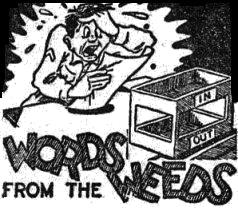 NOT SATISFIED Dear Roundup: A few of us dogfaces are not entirely satisfied with the latest information you gave about the Mars Task Force (Roundup-Feb. 22). If you check the records of this outfit you will find that there are very few Texans from the original National Guard unit formed in Texas still in the outfit. Our complaint is that most of the praise was given to the Texans, whereas most of the fighting was done by men not from Texas. The death of one man from the Third Squadron was the only recognition given to the fighting by our Squadron. We are not trying to belittle the Texans' accomplishments, but we want to give credit to all who deserve credit. - Pvt. John L. Scaife and three others, APO 218 (Myitkyina). |
|
CAVALRY DISMOUNTED
Dear Roundup: Thanks for the space you gave Mars in your two mid-February issues. The boys who offered and gave their blood at the front appreciate it. Of course, some feel they deserve it and more. Perhaps so. Now for the complaint! I am the PRO representative for the 124th and I've all but been tossed in a fox hole and buried like a dead Jap because we were called "Dismounted Infantry" on the 15th and "Infantry" on the 22nd. I don't know who is to blame and don't care, but I do know that there is a mess of died-in-the-wool Cavalrymen hereabouts whose pride has been hurt no end. It was bad enough to dismount us and reorganize us along Infantry lines. We didn't complain about the better ratings men got nor have I heard anyone say they would not take a Combat Infantry badge. Our name is left us, however, as is the regimental flag from Texas National Guard days, and we are terrifically proud of them both. I know of at least one man who has lugged his spurs all the way in his jungle "infantry" pack, afraid to send them home because they are G.I. and refusing to give them up. At any rate, if you insist on being proper, you can treat us as the 1st Cavalry Division is treated and call us 124th Cavalry, dismounted. - Pfc. John Randolph, APO 218. |
|
EDGAR'S DILEMMA
Dear Roundup: The personnel of this Siganl Service Battalion has been deeply offended - even insulted - by your chow wallah correspondent Laytha. We refer, of course, to his article (Roundup-Mar. 8) headed "Graese's Mess Has Best Burma Chow." Laytha has violated the principal tenet of good journalism in that he failed to ascertain all the facts before writing the article. For this we cannot find it in our hearts to forgive him. The best mess in Burma, by popular acclaim (including members of Northern Combat Area Command Headquarters company) is that of this battalion. We feature daily meals that other outfits have only on Christmas. If Yard Bird - excuse me - Sgt. Laytha is not himself convinced of the truth of our claims once he has come out from under the influence of the Headquarter's mess press agent, we will promise him a ride back to delhi in Lord Louis Mountbatten's private plane with a cute blonde hostess for company. - 1st Sgt. Clyde O'Quinn, APO 218. |
14,789 G.I.'s Enrolled In USAFI Schools Here
By JAMES E. BROWN International News Service Staff Correspondent
CALCUTTA - Going to war has meant going to school or college for thousands of soldiers serving in the India-Burma and China Theaters.
Courses offered by the United States Armed Forces Institute, the official Army and Navy school, have become so popular in the two Theaters that total enrollment has reached a figure of approximately 15,000, with six USAFI "colleges" or "universities" having been established for group study.
TRIPLES EACH MONTH
Since the CBI branch of the USAFI was opened last July, the enrollment has more than tripled each month, starting with 594 applications for courses during that month and jumping to 3,167 in February of this year. The total enrollment as of March 1 was 14,789.
The "colleges" or "universities" established in various areas of the Theaters and at which regular classes are held each week include Foxhole University, Basha University, Teke Hai University, North Assam Arts and Business Institute, Chabua University, and Assam Academy. Instructors have been secured for these group classes. Foxhole University tops this list in group attendance with 900, while North Assam Institute boasts 500.
SELF-TEACHING POPULAR
Most popular courses in the theaters are the self-teaching, designed so that the soldier can study a subject entirely on his own, or if he cannot be reached promptly and regularly by mail.
Enlisted men participating in these courses are finding them diversional, instructive, refreshing and highly helpful both in their army careers and post-war plans.
Cpl. Myron F. Heuter of Toledo, O., army transportation clerk who in civilian life was a salesman, found that his course in economics gave him diversion from the usual army brainwork in addition to many better ideas for post-war occupation.
"The course took me away from the usual army thoughts, and gave a bunch of us fellows who came over on the ship together a chance to swap ideas and iron out quite a few points," he said.
PLANS OTHERS
In fact, he liked the course in economics so well that he is planning to take additional ones as soon as army duties give him another breather.
Pvt. Irving Wolk, of Flushing, N.Y., who received a BS degree in Business Administration at Boston University just before Uncle same sent his greetings, recently enrolled as an accounting student merely for the purpose of "brushing up." An Army finance clerk, he has found the initial course in accounting so enlightening that he plans to complete the entire USAFI accounting program. "It's a cinch that I'll never regret filling out that application," he states. "In addition to helping me with my army work, I believe it will enable me to establish myself in an excellent position when I leave the army and start back in civilian life," he added.
Many other enrollees are also singing the paraises if the USAFI in a similar tone.
VARIED COURSES
Self-teaching courses which are now available from the CBI branch of the Institute include Army Clerical, Automotive, Business, English,
|
Military correspondence, auto mechanics, bokkeeping and accounting, shorthand, the small business, algebra and geometry; physics, electricity and radio and many other subjects come beneath these courses.
USAFI correspondence courses in high school, college and technical subjects are not availabale at present for the CBI branch, but applications for them are being received and forwarded to the headquarters in the states.
PERCENTAGE HIGH
Maj. Edward F. Gerold, Jr. of East St. Louis, Ill., commandant of the CBI branch, an attorney in civilian life, reports that the precentage of graduates for the institute in the theaters is unusually high, in fact, much higher than the national level in the U.S. (for the USAFI). Last month 200 of the learn-while-fighting soldiers received their graduation certificates for having completed courses and were proudly displaying them to their G.I. friends in the jungles and in the cities.
Capt. george P. Wild of Weathorford, Okla., the branch supply officer and registrar, claims mounting interest in the soldier study plan, and expects enrollment to continue to rise during coming months. In civilian life he was an instructor at Southwestern Institute of Technology, in Oklahoma.
FREE COURSES
Another officer playing a major part in the CBI program is Lt. Louis J. Cawat of Plymouth, Pa., who is serving as the branch adjutant and guidance officer. In civilian life he was a high school principal in Pennsylvania.
Enlisted personnel pay a fee of $2 for their courses. If they maintain a high standard of work during the initial one, the next course is gratis.
Officer personnel pay a fee of $2 for each self-teaching course.
Japs Out When Dogs Show Up
HQ., 10TH AIR FORCE, BURMA - A Tactical Air Communications Squadron of Maj. Gen. Howard C. Davidson's 10th Air Force has a simple way of letting Squadron Headquarters know when they have entered a town in Burma. They simply ship back a dog.
This Air Corps outfit, the only one of its kind in the Theater, accompanies virtually all of the Allied Ground Forces to direct 10th Air Force planes in bombing and strafing in joint co-operation with ground attacks. Since these teams accompany the forward infantry elements, they are usually among the first to enter captured towns and villages.
Their custom is to grab the first available dog after entering a town where heavy fighting has been encountered, name the dog after the place, then send it back as a mascot. Since they have been in about every major operation in North Burma, the number of dog-mascots has grown to be a major feeding problem.
The prima donna of all the dogs is one called "Commedation," so named after the boys were given a unit commendation by the Commanding General of the 19th Air Force.
|
PRODUCTS OF ARMY TRAINING
BENGAL AIR DEPOT - "You might think my boys were all jewelers or precision instrument men before the war. Actaully, most of them are Army trained."
The source of this quotation was T/Sgt. Jim Glynn, sectiuon chief of the Ordnance instrument repair shop at Bengal Air Depot. Glynn, who formerly worked for an electrical power house equipment firm, is convinced that Army training is capable of producing craftsmen as skilled as any in civilian life.
"Take T/4 Otto Weissman for instance. he's a good all-round man in the shop. Funny, but he used to be in the theatrical business in Yonkers, N.Y. Today he can handle the work on our routine repairs of binoculars, watches, telescopes and compasses.
"T/5 Sam Corey was a welder in the shipyards at Weymouth, Mass. Yesterday he finished a tough job on a piece of AA fire control equipment."
S/Sgt. Bernie Kimmelman, a former Philadelphia jeweler, is credited with doing wonders with salvaged plexiglass as a substitute for watch crystals and other transparent coverings that were unavailable. In the cases of chipped optics where light beams are sent out of proper channels, Kimmelman has resorted to covering the chipped area with black paint. This solves all distortion and image blurring. Kimmelman also was an Aberdeen instructor, doing some optical research work in his spare time.
"A lot of the work done in the instrument section comes through the machinist department," volunteered Cpl. Ray Van Dusen, who spent some pre-Army years as a tool and die maker in Detroit. "We've done a bit of improvising ourselves. Here's a wire puller used to reduce wire to the desired gauge by annealing. On that bench is a special wrench we cooked up for removing the lens from an elbow telescope. Dentists brick tools have been slavaged, and the shop now uses them for scribes. Another angle is a hot plate from an airplane that is used here for cementing lenses."
MAKES COLOR FILTERS
When he received greetings from the President, T/4 Murray Waldron was in Boston. Besides working for a BS degree in physics, Waldron was getting some time experience with the Polaroid Optical Co. Special jobs that have come his way include making color filters for movie cameras used by combat photographers and the replacing of the original plastic washers on binoculars by ribber ones. The latter job provides an air-tight seal protecting delicate parts from dust and moisture.
Lake Placid, N.Y. is the hometown of T/3 Frederick Smith, a college student before he became a G.I. Smith lends his talents to telescopes. A contribution he has colaborated on was the finding of a suitable method of cleaning fungus from prisms. Nitric acid provided the ultimate solution. A wooden clamp to hold small parts in the hand while working, modeled after the diamond setter's ring holder, has proved to be another timesaver.
USE SOAP JARS
Pfc. J. W. Miller hasn't wandered far from his former job of lens grinder since slipping into the khaki. India, as far as the job goes, isn't much different from Austin, Tex. Pressure for production has neccesitated using medical soap jars for acid containers, medical atomizers for dispensing alcohol in cleaning lenses, and the manufacture of a cleaning machine which will wash five watches at the same time.
|
OF B-29 CREW RESCUE
CALCUTTA - Eight members of a crashed B-29 were recently "fished" from the Bay of Bengal in a strange rescue by an American colonel and two enlisted men on an Army fishing cruise in which the rescued airmen were the only "catch."
The presence of the Army boat only 200 yards from the scene of the crash was a fortunate coincidence for the Super-Fort crewmen. Ten minutes later, the Army fishing boat would have been up a waterway in the Sunderbans and completely hidden from the scene of the crash by thick jungle.
When the huge plane was sighted coming in low and obviously in trouble, Lt. Col. M. C. Coop of Abilene, Tex., veterinarian for Base General Depit No.2, SOS, Calcutta, who was on a survey trip to investigate a new method of fishing to supply American troops in this Theater, ordered his boat to head "full steam" after the faltering plane.
200 YARDS AWAY
When the B-29 dropped into the water, Coop's boat was only 200 yards away and soon he, his two enlisted men - Cpl. Gerald J. Witte of Omaha, Neb., and T/Sgt. William F. Lott, of Halls, Tenn., and three Indian crewmen were pulling the airmen out of the water.
An auxiliary boat of a fishing concern which was assisting in the survey, also steamed up to the scene and rescued several men. This boat, piloted by Mr. Norman Caller of Calcutta, burned out its clutch in getting to the crash and later was tied to the Army boat to be pulled into port.
"I couldn't believe it when I heard someone call me to come aboard, and especially an Army boat," said Lt. Robert E. Mumma of Lancaster, Pa., after he got his breath back from the exciting experience.
Others rescued were Capt. Harold Ebbeler of San Antonio, Tex., Lt. James E. Mills of Waterloo, N.Y.; Lt. James R. Lyons of San Antonio, Tex.; Lt. William S. O'Sullivan of Narberth, Pa.; Lt. Leonard T. Olszewski of Shenandoah, Pa.; Sgt. Rudolph E. Sagan of Detroit, Mich.; and Cpl. George A. Snapp Jr., of Detroit.
RADIO POSITION
After two of the men who were injured had been given first-aid by Coop, it was decided to head for the nearest port with railroad facilities on the bay, which was approximately a 12-hour journey. Before crashing, the crew had radioed their position and continuous watch was kept throughout the night for a rescue plane.
Feature of the rescue for the hungry airmen was a wild boar steak dinner served by Coop and his two men. The boar had been shot by Witte from the deck of the boat more than 250 yards away on an island the day before.
With the boar steak were french fried potatoes and tomato and onion salad - which really hit the spot for the airmen. They were made comfortable with blankets on the two boats during the night, while Coop, Witte and Lott kept watch for the rescue plane.
About 3 o'clock the next morning, a flying boat piloted by Lt. J. C. Grahame of Lodi, Cal., was sighted. The B-29 radioman was awakened to signal the plane in code with the powerful searchlight of the boat.
The transfer of the airmen to the plane was accomplished without accident although the water was very rough. About three hours after landing, the rescue plane was able to take off with all eight Super-Fort men aboard.
CRASH KILLS DAD; BABY GETS FUND
HQ., EAC, INDIA - More than $1,000 in voluntary contributions was recently given by members of a combat cargo squadron to establish a college education fund for baby Patricia Sue Hovick, news of whose birth reached India just one day before her father, T/Sgt. Hiram T. Hovick of Long Beach, Cal., died in an air crash on a Burma food-dropping mission.
Hovick had planned a big celebration with his basha mates for the following day after he heard of Patricia's arrival and news of his death stunned his buddies, one of whom suggested the fund as a tribute to Hovick.
Lt. Richard Hayden, squadron adjutant, invested the money in government bonds and placed it in a California bank, payable to Patricia Sue on her 17th birthday.

FORT OF KUTKAI The saw-toothed mountains bite the sky In the distant blue where the airmen fly. The dry, brown plains climb rolling hills, And then run down where the river spills - Where the river spills in clear, cold stream. And the scrub growth spreads its dusty green; Where scrubby trees spread scanty shade. And have a small oasis made. Stands an ancient fort on the nearest knob. Built by man and forgot by God. |
|
The molten sun bakes the red roof tile, And the walls are fallen in rubble pile, The stables stand where the horse was kept, But ruin is heaped where men once slept. The breeched wall apes like a toothless grin Where bricks fell down when the shells came in. A crater yawns in the central court Where a big bomb burst in the ancient fort. The ancient fort, its walls caved in, Has seen too much of the hate of men. From the days of old, when the swinging blade Brought men death in the fight they made. From the days of old, when the gate stood wide, To make a way for the lancers' ride. 'Til now ... hate speaks with big guns' roar, And the sky rains death on the plain's wide floor. The fort may go, but the hills will stand, As a battle place for warring man - As a battle ground through all tomorrows - A fertile field for sowing sorrows. - LT. ROLAND E. UPSHAW, 475th Infantry. |
Leads Juke Box Tunes
NEW YORK - (UP) - Top numbers this week on nationwide juke-boxes were Rum and Coca Cola, by the Andrews Sisters, Accentuate the Positive, as performed by Bing Crosby and the Andrews gals, and Frankie Carle's rendition of A Little on the Lonely Side.
The Crosby-Andrews version of Don't Fence Me In was fourth, ahead of Frank Sinatra singing Saturday Night is Loneliest, Harry James' trumpet in I'm Beginning to See the Light and Les Brown's orchestra playing My Dreams Are Getting Better.
I Dream of You, (T. and J. Dorsey), More 'n' More, (Tommy Dorsey) and Candy (Dinah Shore), filled out the leading ten.
LANDS ON MOUNTAINSIDE STRIP IN NIGHT RESCUE
|
GEN. SULTAN'S HQ., BURMA - Pvt. Hobart T. Hensley, South Bend, Ind., is convalescing in a field hospital somewhere in Burma, and soon expects to rejoin his outfit - a Combat Engineer unit working on the Ledo Road.
But he owes his life to S/Sgt. Thomas M. Sanders, formerly of Houston, Tex., pilot of a tiny liaison plane attached to the "Jungle Jeeps," a unit of the 10th Air Force.
Sanders made his first night flight in this theater several weeks ago, when he volunteered for a mission that required flying a distance of 55 miles over the jungle, with a compass as his sole means of navigation, landing on a newly constructed mountainside airstrip illuminated by the headlights of four jeeps, then taking off again with Hensley, who was suffering from internal injuries caused br being crushed between the body and chassis of a dump truck.
'MERCY SHIP'
Sanders flew a plane named, aptly enough, "The Cleveland Mercy Ship." It is an improved model of the tiny two-seater planes used for evacuation of wounded, artillery spotting, and mail dropping to isolated units in the Burma jungle. Sanders' plane was purchased as part of Cleveland's quota in a war bonds drive. It has a compartment behind the pilot's seat which makes possible evacuation of litter cases.
The Texas pilot took off from Myitkyina shortly after word was received that Hensley required immediate treatment at a field hospital and could only be evacuated in time by plane. Sanders arranged to have four jeeps waiting at the strip, which had been completed only the day before, and took off. In the meantime, four men from Hensley's outfit, including his brother Hubert, carried the unconscious patient two miles to the airstrip and were waiting for Sanders when he arrived.
GIFT CHICKENS
Sanders flew Hensley to a cargo plane strip where an ambulance was waiting. Less than two hours after the call was received, Hensley was receiving expert care at a field hospital. Today he is up and around.
His brother Hubert was so grateful to Sanders that he managed to lay his hands on two live chickens, and gave them to the next liaison pilot who landed at the strip the following day, with instructions to turn them over to Sanders.
One of the chickens disappeared, but Sanders still has the other one. It is now a "Jungle Jeep" pet.
FOUR SUPPLY RECORDS ESTABLISHED BY SOS
CALCUTTA - During the past three-month period, four new records in the handling of supplies at Base section No. 2, SOS, were set, according to letter of commendation to the command from Maj. Gen. W. E. R. Covell, commanding general of Services of Supply in the India-Burma Theater.
Because of security, exact figures cannot be released, but Covell announced that the monthly discharge, rail dispatches, daily ship discharge, and discharge records have been shattered by units under Brig. Gen. R. R. Neyland, commanding general Base Section No. 2, during December, January and February.
In February a port company of the base set a new world's record for the unloading of a Liberty ship in 44½ hours.
"It is an enviable record of achievement, and it could not have been accomplished had determination and initiative to excel been absent," stated the commendation from Covell.
neyland praised the soldiers of transportation units who were directly responsible for the work and also commended the personnel of the entire command for "their services, co-operation, and assistance in making this exemplary performance possible."
|
ATC BASE, ASSAM - "Were it not for the American Serviceman in this area, I don't know how our Missionary would have existed for the past few years."
That statement was made by Father Joseph Dal Broi, SC, recently in explaining the growing success of the St. John Bosco Mission in Assam.
Father Dal Broi, who is missionary priest in charge of the mission, clarified his remark by reporting that personnel of the 1327th AAF BU, ATC, have contributed nearly $3,300 to aid in the upkeep of the mission and its work.
$500 FROM U.S.
One of the largest contributions, he disclosed, came from Cpl. Frank Yellen, who assists Father Dal Broi in his spare time. After Yellen had written his parents of the mission's meager funds, they answered with a $500 money order for the donations.
With this money the mission continued its work. Orphans and poor children, whether Catholic or not, are given homes and an education at the mission's school, where they are taught English and various other subjects and trades.
When the boys have reached a certain age they are sent out to jobs on tea plantations or farms. The girls, who are taught housekeeping and needlecraft, are usually married off to reputable Indians, all arrangements being made through the church. Some students who have shown exceptional interest and capabilities, are sent to advanced school at Shillong, India.
OUT OF DEBT
The missionwas only four years old and deeply in debt when Father Dal Broi took over in 1936. In all of Assam there were only 2,000 Catholics. Today there are nearly 16,000.
And, thanks to the charitable Servicemen, the mission is out of debt, new buildings have been erected and many other improvements made.
NEWS FOR I-B THEATER PRINTED IN CALCUTTA
CALCUTTA - Publishing metropolis for the U.S. Army in the India-Burma Theater is Calcutta.
Form the U.S., plastic plates of the New York Times and Chicago Tribune are flown to Calcutta and printed.
Negative films of the latest copies of Time and Newsweek magazines are flown here for printing. Approximately 12,000 copies of each are printed here.
Among the Army publications printed here for Theater reading are Yank and Roundup, the mats for the Theater newspaper being flown here from New Delhi. The China Lantern is also published in Calcutta.
Special Service Section of Base Section No. 2 also distributes thousands of copies of other civilian magazines.
Lt. Walter J. Haley of Dayton, O., base publication officer, believes the service being given to the men in this Theater is the finest in the world, taking into consideration the fact that G.I.'s here are, as "Uncle Joe" Stilwell said, "at the end of the line."
The entire operation is Lend-Lease in reverse, with the publications officer making indents against the Government of India. The initial publishing was done on Indian paper, but now all newsprint is requisitioned from the U.S.
Combat Cargo Has Own Song; 'Blues' Parody
|
|
BLUES IN ASSAM Tune: Blues In The Night My instructor done tol' me, when I was a kay-det My instructor done tol' me, Son, If you're over in Assam don't fly Combat Cargo For they have one word, that's law. And that word is "tonnage." And it will give you and every air crew The Blues In Assam See the rain a-fallin' Hear the C.O. callin' Tonnage-- Get into the gray Don't sir here all day! He's a worrisome thing Who'll lead you to sing The Blues In Assam From Dinjan to Bhamo from Ledo to Mogaung. Wherever the monsoons blow: I've been in some tight spots. I've run into Zeros. But there is one thing I know: My last trip to Momauk Was a worrisome thing that would lead you to sing |
|
The Blues In Assam Hear the Group a-callin' Hear the Squadron squallin' Tonnage-- We want more tonnage-- It's a worrisome thing That'll lead you to sing The Blues In Assam. From Jorhat to Kunming from Assam to China Wherever the ground fog's low If a prop's in full feather in the worst kind of weather There's always one thing I know There's no place to land it It's a worrisome thing that'll lead you to sing The Blues In Assam Hear the Chinese cryin' Hear the Limeys sighin' Ammo-- Bring us the ammo. The groceries and ammo They're worrisome things That'll lead you to sing The Blues In Assam. |
|
HQ., EASTERN AIR COMMAND - A strong combined force of USAAF B-24's and RAF Liberators this week flew their longest formation mission of the war, a 2,500-mile, 17½-hour journey to the Kra Isthmus in Malaya, where they struck from as low as 440 feet at the Na Nien railway sidings.
The planes braved ack-ack to sow explosives on the target, leaving a large oil fire and much of the yards burnt out, with damage to trains and bridges. Some crews passed within 700 miles of Singapore on the trip, which was equivalent to a nonstop hop from London to Leningrad and back.
REVISED SCORE
This effort came one week after EAC Mustangs had flown the war's longest fighter mission against Don Muang airfield in Thailand. Additional reports this week on the fighter attack indetified for the first time the Second Air Commando group, the planes of which carried out the strike. Further interrogation and gun camera photographs boosted the total of japanese aircraft destroyed to 31, with 13 others damaged.
The heavies were out again three days after their record-length mission, leaving a 250-mile trail of wreckage along the Bangkok-Chiengmai rail line in a daybreak train-busting operation. Other B-24's bombed wireless
|
HIT AIRFIELD
Air Commando Mustangs strafed radio installations near Rangoon and Bassein in South Burma, also hitting rivercraft. Airfields in the Rangoon area, at Chiengmai in Thailand, and in the Tavoy and Moulmein districts were attacked during the week, destroying seven Jap planes and damaging stores, barracks and revetments.
Super Fortresses of the XX Bomber Command and B-24's and Liberators of the Strategic Air Force combined to strike a heavy blow at a supply area near Rangoon. B-25's bombed Jap supplies along the Rangoon-Mandalay railroad, while fighter-bombers harried the enemy on the road from Maymyo to Hsipaw in the north.
The Arakan was quiet, although Spitfires and Hurricanes were in action against supply dumps near Taungup and Gwa.
14TH A.F. PLANES RIP NIP COLUMNS
HQ., 14TH AIR FORCE - Japanese columns massing northwest of hankow and railroad installations around Kaifeng on the Peiping-Hankow line were heavily attacked this week by 14th Air Force planes, although bad weather prevented operations elsewhere in Central and Western China.
Chungking spokesmen claimed 60,000 enemy troops, including mechanized units, were in the Hankow area, thrusting presumably to seize the vital wheat crop of southern Honan and northern Hupien provinces. Three Jap divisions were also reported driving on the American airbase at Laohokow in North Central China, but Chinese units attacking Kanhsien, former U.S. airbase to the south, claimed gains.
The Roundup is a weekly newspaper of the United States Forces, published by and for the men in Burma and India, from news and pictures supplied by staff members, soldier correspondents, United Press, OWI, and Army News Service. The Roundup is published Thursday of each week and is printed by The Statesman in New Delhi and Calcutta, India. Editorial matter should be sent directly to Capt. Floyd Walter, Hq., U.S.F., I.B.T., New Delhi, India, and should arrive not later than Sunday in order to be included in that week's issue. Pictures must arrive by Saturday and must be negatives or enlargements. Stories should contain full name and organization of sender. Complaints about circulation should be sent directly to Lt. S.R. Rose, Hq., U.S.F., I.B.T., New Delhi, India. Units on the mailing list should make notification of any major change in personnel strength or any change of APO.

|
MARCH 29, 1945
Adapted from the original issue of I.B.T. Roundup
Copyright © 2007 Carl Warren Weidenburner
TOP OF PAGE PRINT THIS PAGE ABOUT THIS PAGE SEND COMMENTS
PREVIOUS ISSUE CLOSE THIS WINDOW NEXT ISSUE
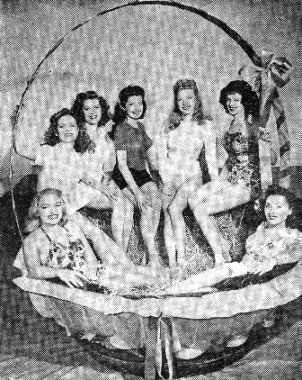
 Zuzka Zenta is a war refugee from Czechoslovakia. She is now acting over the radio in New York and has applied
for U.S. citizenship. She has changed her name to Susan Douglas, selected from a telephone book.
Zuzka Zenta is a war refugee from Czechoslovakia. She is now acting over the radio in New York and has applied
for U.S. citizenship. She has changed her name to Susan Douglas, selected from a telephone book.
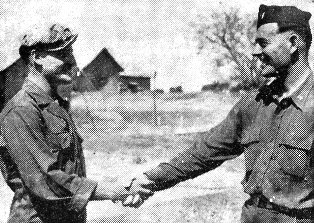 Pfc. George A. Cornali, Walsenburg, Colo., is congratulated by Lt. Francis J. Sims, commanding officer of his
ASC Quartermaster Truck Company, upon his appointment to the U.S. Military Academy. He has served seven months in
the India-Burma Air Service Command. Cornali will attend Cornell University for refresher courses before beginning
his West Point training.
Pfc. George A. Cornali, Walsenburg, Colo., is congratulated by Lt. Francis J. Sims, commanding officer of his
ASC Quartermaster Truck Company, upon his appointment to the U.S. Military Academy. He has served seven months in
the India-Burma Air Service Command. Cornali will attend Cornell University for refresher courses before beginning
his West Point training.
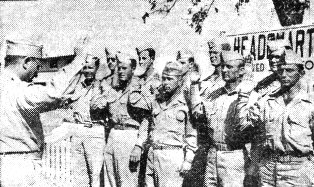 Col. Frank Milani, I-B Theater Adjutant General, administers the officers' oath to 10 men of the Mars Task Force
commisioned for gallantry in the North Burma campaign.
Col. Frank Milani, I-B Theater Adjutant General, administers the officers' oath to 10 men of the Mars Task Force
commisioned for gallantry in the North Burma campaign.
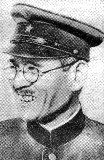 Here is Gen. Yasuji Okamura, commanding general of the Japanese ground forces on the China mainland, according
to radio Tokyo. Gen. Joseph W. Stilwell says the final battle of the war against Japan must be fought in China.
Here is Gen. Yasuji Okamura, commanding general of the Japanese ground forces on the China mainland, according
to radio Tokyo. Gen. Joseph W. Stilwell says the final battle of the war against Japan must be fought in China.
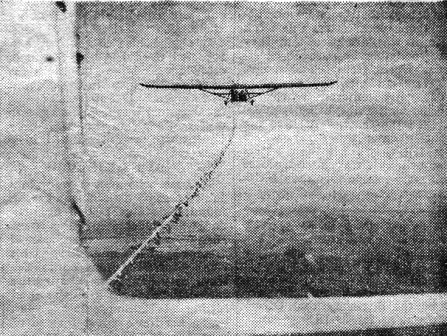 An Air Commando glider carrying airfield control equipment was the first aircraft to land on the first airstrip
in the Meiktila group captured during the 14th Army penetration. here the glider is being towed to an advance base
in Burma in preparation for the operation. Note the wire establishing communication between plane and glider strung
loosely along the tow rope giving it a frayed appearance.
An Air Commando glider carrying airfield control equipment was the first aircraft to land on the first airstrip
in the Meiktila group captured during the 14th Army penetration. here the glider is being towed to an advance base
in Burma in preparation for the operation. Note the wire establishing communication between plane and glider strung
loosely along the tow rope giving it a frayed appearance.
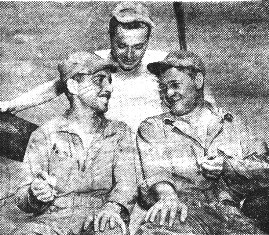 Three new crew chiefs of the XX Bomber Command display Bronze Star Medals awarded for efficiency in maintaining
B-29's operating in the India-Burma and China Theaters. left to right are M/Sgt. Kenneth Day, Waban, Mass.; M/Sgt.
William Kolynych, Clifton Heights, Pa.; and M/Sgt. Bruce Mahler, Seattle, Wash.
Three new crew chiefs of the XX Bomber Command display Bronze Star Medals awarded for efficiency in maintaining
B-29's operating in the India-Burma and China Theaters. left to right are M/Sgt. Kenneth Day, Waban, Mass.; M/Sgt.
William Kolynych, Clifton Heights, Pa.; and M/Sgt. Bruce Mahler, Seattle, Wash.
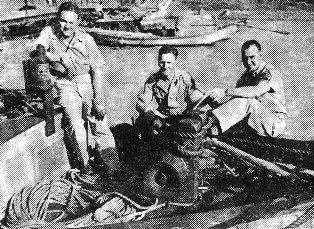 Just before taking off on their fishing cruise in which they rescued eight crewmwn of a crashed B-29 in the Bay
of Bengal, the three fishermen get one taken for the album. Left to right: Lt. Col. M. C. Coop of Abilene, Tex.,
Cpl. Gerald J. Witte, Omaha, Neb., and T/Sgt. William F. Lott, Halls, Tenn.
Just before taking off on their fishing cruise in which they rescued eight crewmwn of a crashed B-29 in the Bay
of Bengal, the three fishermen get one taken for the album. Left to right: Lt. Col. M. C. Coop of Abilene, Tex.,
Cpl. Gerald J. Witte, Omaha, Neb., and T/Sgt. William F. Lott, Halls, Tenn.
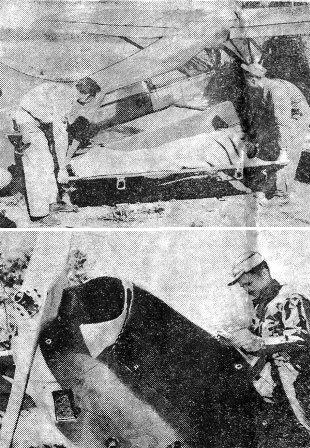 At the top two men are shown loading a stretcher aboard the "Cleveland Mercy Ship," an improved model of the
two-seater liaison plane, used chiefly for evacuation of wounded. In the bottom photo, S.Sgt. Thomas M. Sanders,
liaison pilot, poses beside the "Mercy Ship." It was in this plane that Sanders landed on the side of a mountain
at night to rescue injured Pvt. Hobart T. Hensley.
At the top two men are shown loading a stretcher aboard the "Cleveland Mercy Ship," an improved model of the
two-seater liaison plane, used chiefly for evacuation of wounded. In the bottom photo, S.Sgt. Thomas M. Sanders,
liaison pilot, poses beside the "Mercy Ship." It was in this plane that Sanders landed on the side of a mountain
at night to rescue injured Pvt. Hobart T. Hensley.
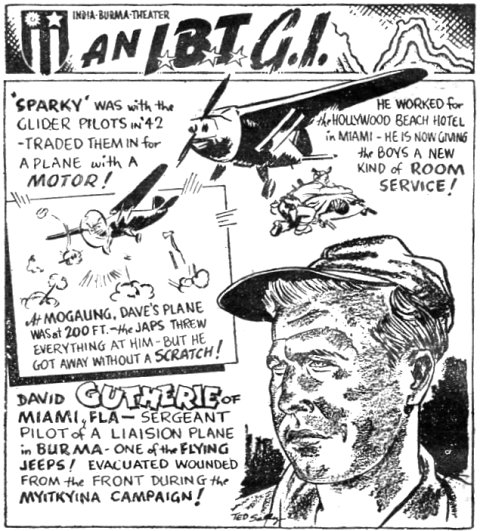
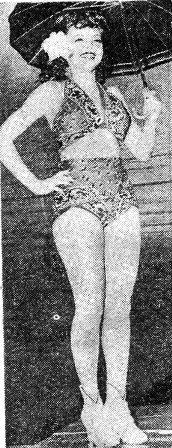 MGM starlet Jean Porter knows Hollywood must have its leg art, rain or no rain.
MGM starlet Jean Porter knows Hollywood must have its leg art, rain or no rain.
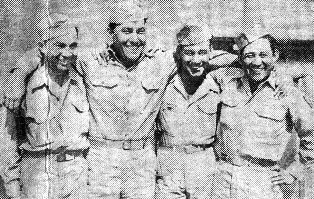 These boys of the 1327th BU, Assam, all were shipped overseas at different intervals and wound up at the same place.
The surprising part is that each of them is a native of the same town, San Diego, Tex., where they lived in the same
block. From left to right are Pfc. Jose M. Gonzalez, Cpl. Reynaldo Herrera, Pfc. Lorenzo, and Pedro C. Cabello.
These boys of the 1327th BU, Assam, all were shipped overseas at different intervals and wound up at the same place.
The surprising part is that each of them is a native of the same town, San Diego, Tex., where they lived in the same
block. From left to right are Pfc. Jose M. Gonzalez, Cpl. Reynaldo Herrera, Pfc. Lorenzo, and Pedro C. Cabello.